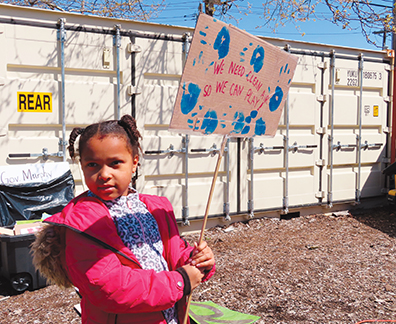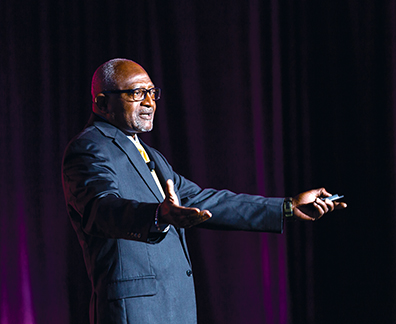By LISA EISENHAUER
INDIANAPOLIS — Robert D. Bullard says that unless practices and policies change, global warming is on course to take an unequal toll on communities of color in the United States just as environmental degradation historically has.
"How do we build justice into our sustainability, our resilience plans, our climate action plans, our health equity plans?" he asked. "We have to think and plan for doing it. It just doesn't happen."

A child prepares to join a protest against a proposed backup power plant for a sewage treatment facility in Newark, New Jersey, in April. Researchers say many minority communities are overburdened with sources of pollution.
Wayne Parry/Associated Press
Widely known as the father of environmental justice, Bullard has written 18 books on the topic. He directs the Bullard Center for Environmental and Climate Justice and is a distinguished professor of urban planning and environmental policy at Texas Southern
University, a founding director of the Environmental Justice Resource Center at Clark Atlanta University, and co-founder of the HBCU Climate Change Consortium.
He discussed the disparate impact of pollution, waste disposal and other environmental threats and the nation's unequal response to them on the opening day of the 2022 Catholic Health Assembly. He gave the memorial lecture named in honor of Bishop Joseph
M. Sullivan, who worked to bring about healing for all people, especially the most vulnerable.
The environmental sociologist said his attention was drawn to environmental injustice in the late 1970s, when he assisted his wife with a lawsuit she brought over the planned location of a Houston landfill. His research showed that from the 1930s to 1978,
82% of the city's trash was disposed in dump sites located in predominantly Black neighborhoods even though Blacks comprised only 25% of the city's population.
Despite losing that case, Bullard said it was a wake-up call. His research convinced him that "America is segregated and so is pollution" and he started a now four-decades-long quest to figure out how to force change.

Robert D. Bullard, a prolific author who directs the Bullard Center for Environmental and Climate Justice at Texas Southern University, speaks at the Catholic Health Assembly on the uneven impact of pollution and environmental degradation on communities
of color.
Jerry Naunheim Jr./© CHA
Many researchers have followed his lead in documenting the unequal toll of pollution and environmental damage. He cited studies that show people of color are more likely than whites to breathe air with dangerous levels of particulate matter such as soot
and that minority neighborhoods typically have less green space than white neighborhoods.
He pointed out that pollution and proximity to industrial toxins can have devastating impacts on health, such as raising the incidence of asthma and cardiovascular disease. He also noted that the residents of neighborhoods close to pollution sources and
short on parks and other natural amenities don't see the same economic gains from home ownership.
For his 2012 book, The Wrong Complexion for Protection: How the Government Response to Disaster Endangers African American Communities, Bullard and co-author Beverly Wright looked at whether over the previous eight decades of natural and human-made
disasters the government had responded equally and fairly to all communities. "The short answer is no," he said.
His analysis showed that recovery funds and remediation programs tended to mostly benefit white Americans despite the fact that communities of color suffer the worst losses and face the worst threats. It led him to the conclusion that the government won't
protect its most vulnerable citizens from the effects of climate change unless forced to do so.
Bullard is one of the 25 members of the White House Environmental Justice Advisory Council that President Joe Biden set up to counsel
his administration on how to address current and historic environmental injustice. Justice40 is among administration initiatives
the council is consulting on. The initiative's goal is to have 40% of the overall benefits from environmental programs, such as for clean energy and the remediation of legacy pollution, flow to disadvantaged communities.
Bullard said that without intentional approaches environmental disparities will persist. "If we don't work on it, we will reproduce the inequality and allow our country to become much more unequal, unfair and unjust," he said. "We cannot allow that to
happen. We need everybody working on this together."